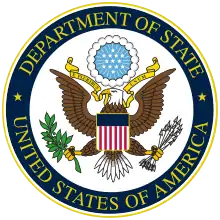Reginald Bartholomew
Reginald Bartholomew (February 17, 1936, Portland, Maine – August 26, 2012, New York City, New York) was an American diplomat and former United States Ambassador to Lebanon (1983–86), Spain (1986–89), and Italy (1993–97).[1] He was also a member of the American Academy of Diplomacy and Council on Foreign Relations. Additionally, he was a former member of the United States National Security Council staff (1977–1979).
Reginald Bartholomew | |
|---|---|
.jpg.webp) Bartholomew, wounded, speaks in Beirut in 1984 | |
| Born | Reginald Bartholomew February 17, 1936 |
| Died | August 26, 2012 (aged 76) |
| Alma mater | Dartmouth College, University of Chicago |
| Occupation | United States Ambassador |
| Spouse(s) | Rose-Anne (née Dognin) |
Education and early career
Bartholomew earned a bachelor's degree in history and political science from Dartmouth College in 1958 and a master's degree in political science from the University of Chicago.[1] He later returned to the University of Chicago to teach social sciences and government. Bartholomew taught at Wesleyan University as well, from 1964 to 1968.[2] While there, he met and befriended current President Emeritus of the Council on Foreign Relations, Leslie H. Gelb, then a fellow instructor. In 1967, Gelb left to work as a policy adviser at the Pentagon, persuading Bartholomew to join him the following year. Both occupied various departments in different roles, with Bartholomew working at the National Security Council during the Carter administration and later succeeding Gelb as the director of politico-military affairs at the State Department.[3]
Diplomatic career
Prior to his first ambassadorship, Bartholomew spent 15 years advising presidents and secretaries of state, most notably playing a key role in the SALT II arms limitation talks with the Soviet Union in 1979.[3]
In 1983, Bartholomew was appointed ambassador to Lebanon. In the following years, terrorists bombed the newly constructed United States Embassy, as well as a Marine barracks. The escalating violence pressured the United States to pull its troops from the region. Under Bartholomew's advisement however, President Reagan delayed ordering the withdrawal until February 1984.[3]
Bartholomew was appointed ambassador to Spain in 1986, where he led negotiations to preserve a greatly reduced military presence. He had worked on similar negotiations before and would again later, in Italy, where he served as ambassador from 1993 to 1997.[3]
Upon retirement, he joined Merrill Lynch Investment Banking as Vice-Chairman Europe and Chairman Italy (1997-2011).
He died in New York City, aged 76, from cancer. His survivors include his wife of 56 years, Rose-Anne (née Dognin), four children, a brother, and seven grandchildren.[4]
References
- Emily Langer (August 25, 2012). "Diplomat Reginald Bartholomew dies". The Washington Post. Retrieved December 15, 2014.
- Reginald Bartholomew profile at NNDB.com
- Yardley, William (August 29, 2012). "Reginald Bartholomew, Busy Diplomat, Dies at 76". nytimes.com. The New York Times. Retrieved January 12, 2015.
- "Reginald Bartholomew | Senior diplomat, 76". philly.com. Philadelphia Media Network. September 1, 2012. Retrieved December 15, 2014.
External links
| Government offices | ||
|---|---|---|
| Preceded by Leslie H. Gelb |
Director of the Bureau of Politico-Military Affairs July 1, 1979 – January 20, 1981 |
Succeeded by Richard Burt |
| Diplomatic posts | ||
| Preceded by Robert Sherwood Dillon |
United States Ambassador to Lebanon 1983–1986 |
Succeeded by John Hubert Kelly |
| Preceded by Thomas Ostrom Enders |
United States Ambassador to Spain 1986–1989 |
Succeeded by Joseph Zappala |
| Preceded by Peter F. Secchia |
United States Ambassador to Italy 1993–1997 |
Succeeded by Thomas M. Foglietta |
